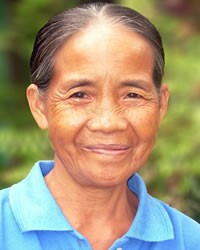Lampung Pubian in Indonesia

Photo Source:
Copyrighted © 2026
Anonymous All rights reserved. Used with permission |
Send Joshua Project a map of this people group.
|
| People Name: | Lampung Pubian |
| Country: | Indonesia |
| 10/40 Window: | Yes |
| Population: | 118,000 |
| World Population: | 118,000 |
| Primary Language: | Lampung Api |
| Primary Religion: | Islam |
| Christian Adherents: | 0.03 % |
| Evangelicals: | 0.03 % |
| Scripture: | New Testament |
| Ministry Resources: | Yes |
| Jesus Film: | Yes |
| Audio Recordings: | Yes |
| People Cluster: | Lampung of Sumatra |
| Affinity Bloc: | Malay Peoples |
| Progress Level: |
|
Introduction / History
The Lampung Pubian are a group who have a very clear cultural organizational structure, which separates them from other peoples within the Lampung cluster. The Pubian are also called the Three Clans of Pubian (Pubian Telu Suku) because in the past they were made up of three clans (buay) but now consist of twelve clans. The concept of clan (suku) for the Pubian refers to a broader association than for other groups in the region, because for them a clan can consist of several villages. The Pubian are made up of two subgroups, the Manyarakat and the Temu Pupus. The Manyarakat are made up of six clans: Kediangan, Gunung, Selagai, Manik, Nyurang and Kapal. The Temu Pupus are also made of six clans: Nyuan, Pemuka Pati, Pemuka Menang, Pemuka Halom Bawak, Pemuka Senima and Kuning. The Pubian live in the regencies of South Lampung, Tanggamus, Central Lampung and in Bandar Lampung city. Their villages are located on the lowland plains spreading to the east. For centuries they have had to stay clear of the Abung people, who have forbidden them to cross the border between their areas. Today, the Lampung Pubian have mixed with the other indigenous peoples and have their own territory, a small area in Central Lampung regency.
What Are Their Lives Like?
The Lampung Pubian settlements are at the same sites as they have been for a long time. Every clan (marga) owns a permanent house that is usually inhabited only by the elderly. Most young adults and children live in seasonal homes called umbulan. Characteristic Lampung Pubian villages are made up of long, elevated wooden homes (sesat), situated around the village government buildings. These homes have one large room that has been partitioned off to create smaller rooms for members of the community. However, modern-day homes have begun to shift from this traditional elevated wooden home style to homes that are only partially elevated or to typical ground-level concrete and wood homes. The Pubian live apart from non-Lampung people who move into the area, because the newcomers often settle in dry field areas. The primary means of livelihood for the Pubian is farming and almost none of them work as fishermen because they tend to live in areas that are far from the coast. The Pubian speak the Lampung Api language. The word api means "what?". Most Pubian can speak Indonesian. Many of them also can speak the languages of transmigrants like Javanese and Sundanese. They hold to the customs (adat) of the Pepadun tradition. The word pepadun means "chair" or a seat used by a ruler. The leadership system in Pubian is congregational in that there are many punyimbang (cultural leaders) who have the right of voice in community meetings, acting much like a congress. Family ties among the Pubian are very strong and the Pubian clans use a system of consensus for resolving issues amongst themselves.
What Are Their Beliefs?
The Lampung Pubian hold very strongly to their Islamic identity. But there is a dualistic view of religion among the Pubian. On one hand, there is a belief that all religions are good and their teachings are basically the same, just with different means of achieving the same ends. But on the other hand, they also believe very strongly that Islam is right and they view followers of other religions as unbelievers.
What Are Their Needs?
Social and public facilities are greatly needed among the Lampung Pubian. Good education and health care are also needed in order to improve their quality of living. Adequate land and jobs for the Pubian could decrease their jealousy toward the transmigrant communities who live around them.
Prayer Points
Pray for God's divine intervention in this community to know and accept Christ as their Lord.
Pray for God to soften their hearts and to know that Jesus is the way, the truth and the life.
Pray for more Christian communities to grow in their location to show them the blessings of a Christ-centered life.
Pray for the Lord to send dreams of the risen and victorious Christ to their elders.